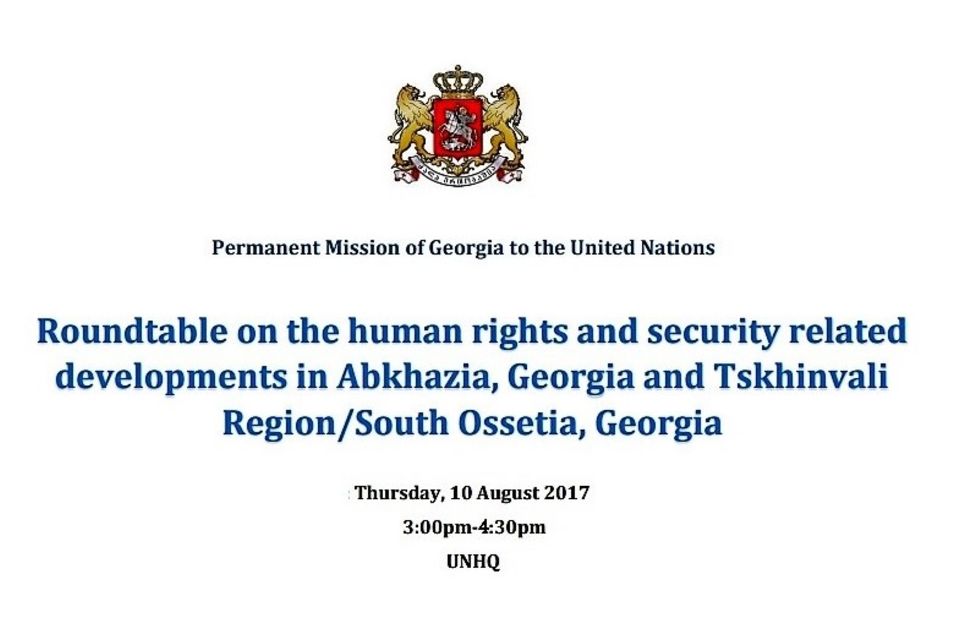Statement by Chargé d’affaires of Ukraine to the United Nations YURI VITRENKO at the Roundtable on the Human Rights in the Occupied Regions of Georgia

Ambassadors, Friends and Colleagues,
First of all, thank you Georgian Mission for hosting this much-needed and timely event.
To say that enough attention is being paid to this one of the most pressing European issues by the UN – either in NY or Geneva – would be an overstatement. In fact, it’s not nearly enough. This is not right and has to be redressed.
This is why this event is much-needed.
It is extremely timely since it comes on the heels of the ninth anniversary of the root cause of this situation– namely the Russian aggression against Georgia and occupation of the integral parts of its territory – Abkhazia and the Tskhinvali region.
On this sad occasion Ukraine reiterated – loud and clear, including through the phone call between the two Presidents, as well as dedicated MFA statement – its full and unwavering commitment to our Georgian brothers and sisters’ political independence, sovereignty and territorial integrity.
Mister Chair,
Just a few weeks ago President of Ukraine Petro Poroshenko paid a visit to Georgia, where he and his Georgian counterpart Giorgi Margvelashvili went to the delimitation line with the region of Tskhinvali, currently occupied by Russia.
“An abyss between the past and the future” – this was my President’s impression.
One cannot but feel it while reading the report before us today. This is exactly what transpires from each every page of this document.
I was struck how similar are the patterns of gross HR violations in the occupied territories of Georgia and Ukraine.
- The same inhuman treatment
- Kidnappings
- Arbitrary detention
- Torture and ill-treatment
- Deprivation of the right for education in the native language
- Interference with property rights and other discriminations
- Last but not least – continuous denial of access to international and regional monitors, including UN human rights mechanisms, to both Georgian regions.
Dear Colleagues,
What can be done about this?
In our view, the answer can be two-fold.
Firstly – we cannot address the consequences epitomized by HR degradation without removing the root cause – Russian creeping occupation of Georgia or, in the case of Ukraine, Kremlin’s ongoing hybrid aggression.
For this, the very least we can do is to start calling a spade a spade. We should stop shying away from the “inconvenient truth” and hiding behind such convenient euphemisms like “conflict in Georgia”, “Ukrainian conflict” and others. Since what we have here is a clear-cut foreign aggression and occupation, with Russia as an occupying power, recognized as such by the General Assembly.
This is exactly what was one of the goals of the open debate “Conflicts in Europe” Ukraine organized as part of its Presidency in the UN Security Council this February. Availing myself of this opportunity, I would like again to thank all delegations which participated in this one-of-a-kind session.
Secondly – and this is where the UN comes into play even more – we should keep raising international awareness and profile of this pressing issue.
Here, the notion of “international eyes and ears”, ideally on the ground, for the sake of objective reporting lines holds one of the keys.
For this to happen, the Office of the UN High Commissioner for Human Rights has to redouble efforts with the aim to access the occupied Georgian territories and present a written report on its implementation pursuant to the HRC Resolution 34/37.
Equally, all relevant international and regional human rights mechanism, first of all those of the Council of Europe and the OSCE, have to continue their efforts to find ways and means of monitoring situation of human rights on the occupied Georgian territory.
In parallel, we should keep the issue at hand as high as possible on the agenda of major UN fora, primarily of the General Assembly, Security Council and Human Rights Council.
Yet, as we will approach the 10th anniversary of the occupation of Abkhazia and the Tskhinvali region, the bar shell be set higher. Here we could think of, inter alia, introducing a dedicated UNGA resolution, with a seminal “Situation of Human Rights in the Autonomous Republic of Crimea and the city of Sevastopol” serving as a fresh example.
I thank you.
